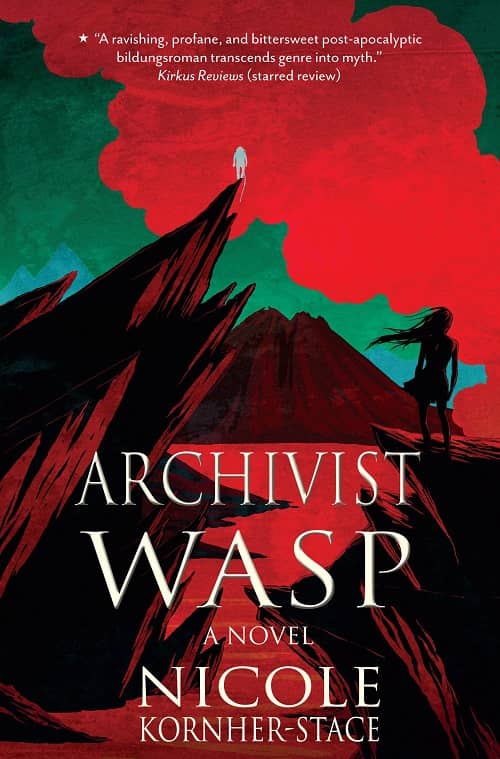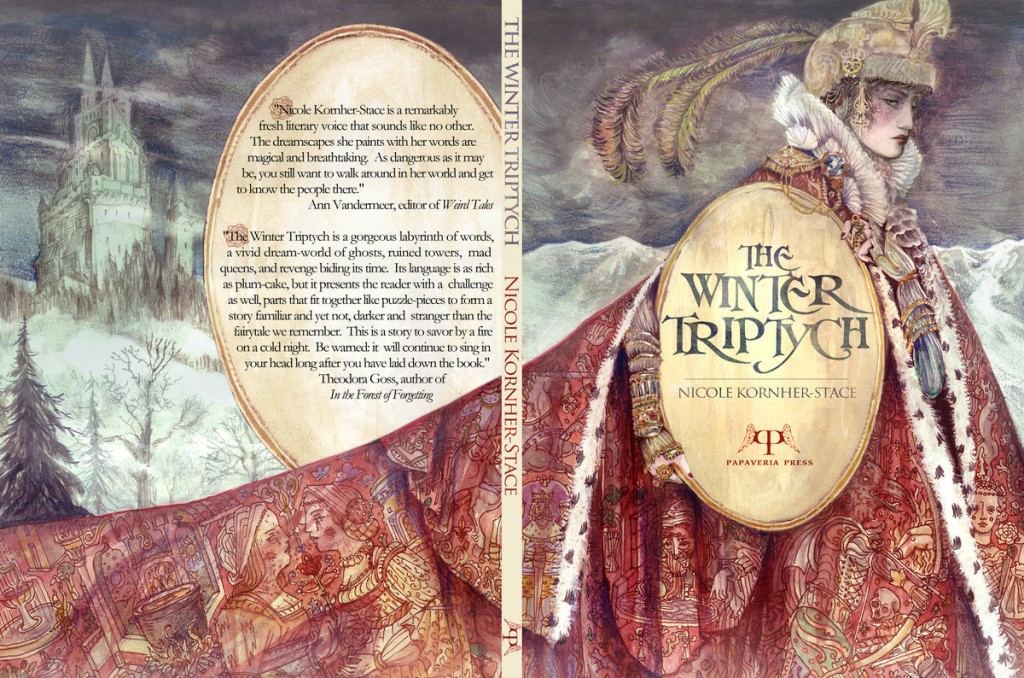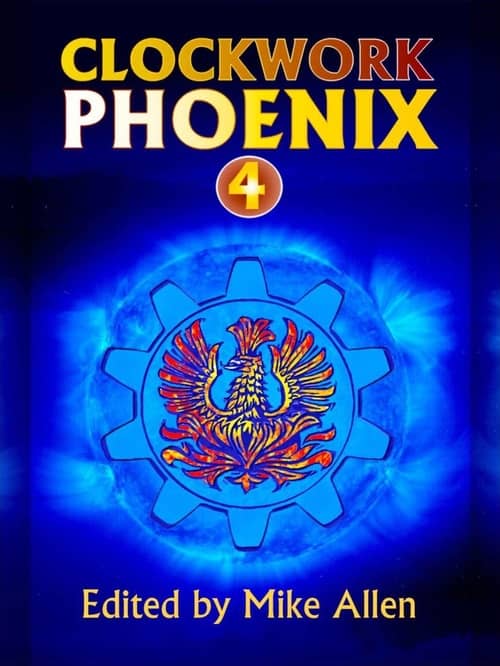The Latchkey Revelation: An Interview with Nicole Kornher-Stace
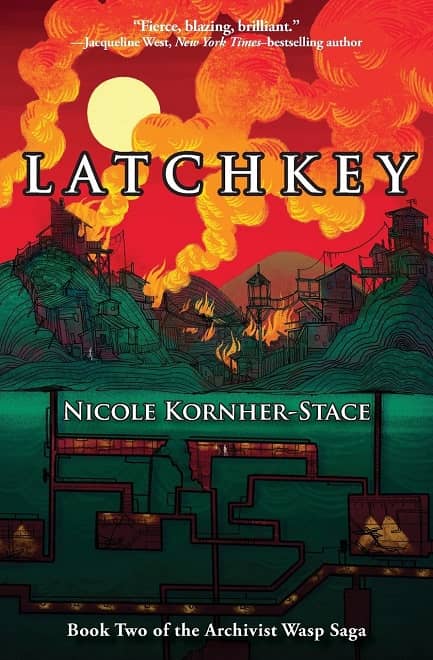 |
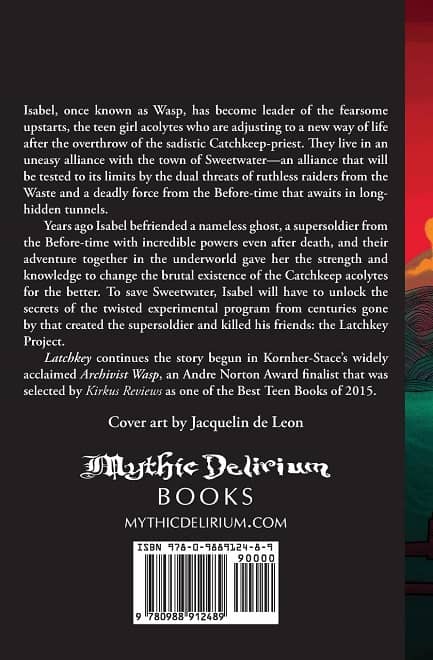 |
O long, long have I anti…cipated (yes, just like that) the sequel to Nicole Kornher-Stace’s Archivist Wasp. A book about ghosts and girls, ferocity and friendship, catastrophe and cataclysm and katabasis and a whole badass bunch of other alliterative nouns, Archivist Wasp published in 2015 by Big Mouth House, an imprint of Small Beer Press.
So you see, that was ALMOST THREE WHOLE YEARS AGO! I’ve been WAITING and WAITING and WAAAAIIIITIIINNNGGG!
But fear not. That time of endlessly unfulfilled appetite has not been wasted. I have not waited in vain. For now — at last! — the day I have yearned for is AT HAND!
(*cues Phantom of the Opera synthesizers and a falling chandelier*)
Nicole Kornher-Stace has done her job, and done it well. And Mythic Delirium has abetted her by publishing it. Soon! In July! This year! And you can PRE-ORDER IT HERE!
[Click the images for cataclysm-sized versions.]
I. THE BOOK
From Mythic Delirium’s website:
Latchkey continues the story begun in Kornher-Stace’s widely acclaimed Archivist Wasp, an Andre Norton Award finalist that was selected by Kirkus Reviews as one of the Best Teen Books of 2015.
Isabel, once known as Wasp, has become leader of the fearsome upstarts, the teen girl acolytes who are adjusting to a new way of life after the overthrow of the sadistic Catchkeep-priest. They live in an uneasy alliance with the town of Sweetwater — an alliance that will be tested to its limits by the dual threats of ruthless raiders from the Waste and a deadly force from the Before-time that awaits in long-hidden tunnels.
Years ago Isabel befriended a nameless ghost, a supersoldier from the Before-time with incredible powers even after death, and their adventure together in the underworld gave her the strength and knowledge to change the brutal existence of the Catchkeep acolytes for the better. To save Sweetwater, Isabel will have to unlock the secrets of the twisted experimental program from centuries gone by that created the supersoldier and killed his friends: the Latchkey Project.
II. THE BLURBS
“Fierce, blazing, brilliant. The mythic and brutal world of Nicole Kornher-Stace’s Latchkey is so richly realized, you don’t step into it, you fall.”
—Jacqueline West, New York Times–bestselling author of The Books of Elsewhere
“Nicole Kornher-Stace’s Latchkey is a little like retracing a war veteran’s scars with a scalpel and asking, ‘So. Does this hurt more than the original?’ It does, of course. Hurts good, hurts deep, this almost-familiar world that bleeds right into ours, where the only thing fiercer than ferocity is tenderness—though both talk equally as tough. After reading Latchkey, one starts seeing ruins superimposed over currently thriving structures. Every struggling patch of city lawn becomes a garden of ghost grass; every breezy puff of leftover winter holds the possibility of frostbite and vertigo and seeing the face of a long-lost friend once more. Has there ever been such longing, fueled by such darkness and adrenaline? Has there ever been such satisfaction, and at such a cost?”
—C. S. E. Cooney, World Fantasy Award-winning author of Bone Swans
(^–Ahem! THAT’S ME, EVERYBODY! I WROTE THAT! BECAUSE I READ THE BOOK! YAY!!!)
“Latchkey is the opposite of escapist: it is, instead, horror for people with the courage to benefit from beholding actual horrors. Building on the deeply-realized Archivist Wasp, in Latchkey we are given a world even more fallen and brutal, for now even the old order of the archivists is broken. Here, when heroes are hurt, they stay hurt; here, the survivors must endure trauma without the words to describe it; here, knowledge itself is both deeply suspect and humanity’s only hope. History itself, embodied by blood-hungry ghosts, by turns cannibalizes the living and provides the only way forward. And yet, for all the loss and bodily pain, Latchkey shows us the power of community and the worth, greater than diamonds, of courage. Cathartic, feminist, explosively imaginative and masterfully told, Kornher-Stace gives us a second-world fantasy that transports our minds while, time and again, it emotionally arrives.”
—Carlos Hernandez, author of Sal and Gabi Break the Universe
“What a great read! This surreal dreamscape of a book delves deeper into the unique world of the Andre Norton Award finalist Archivist Wasp, continuing a resilient heroine’s unusual friendship with a super-soldier ghost amid a far-future dystopia they both struggle to survive and understand.”
—Beth Cato, author of The Clockwork Dagger and Breath of Earth
“Nicole Kornher-Stace’s Latchkey is a completely unique and enthralling story. A blend of fantasy, paranormal and more that defies categorization, I couldn’t put it down. Highly recommended!”
—Jennifer Brody, award-winning author of The 13th Continuum
III. THE INTERVIEW
CSEC: You’re probably tired of telling this origin story, but once more with feeling: what were the first seeds of the story that became ARCHIVIST WASP and now LATCHKEY? Tell us a bit about your journey from its genesis to this new upcoming release date.
NKS: I tend to come up with story ideas in kind of a sideways manner, hoarding shiny things until I have enough of them to coalesce. So rather than coming up with something sensible first, like, oh I dunno, A PLOT? instead I’ll have a loose list of points in my head — off the top of my halfbaked ideas pile, generation ship utopia heist — and then I have to figure out how to constellate those mismatched things until they start to look something vaguely like a story. I mean, they could all be separate book ideas, but where’s the fun in that? I like writing complex ideas (“too dense, needs to be unpacked into a longer piece” is an accusation critics have loved to level at me) so I need a lot of shiny things before I can figure out how to make something out of them. With Archivist Wasp specifically, I mostly had the characters, but I didn’t really know who they were. I wanted them to all live in the same book for some godforsaken reason, but I wasn’t immediately sure how to do that as they come from such drastically different time periods. Then it hit me: have one of them be a ghosthunter and two of them be dead. Then the book pretty much came together from there.
The setting arrived in my mind whole, thanks mostly to the fact I was reading The Golden Bough at the same time I was playing Fallout 3. The mythology is a mishmash. A ton of people have seen Orpheus and Eurydice in the plot, but that wasn’t a conscious influence. Though in hindsight I can DEFINITELY SEE where they’re coming from.
Overall I’ve realized that I have to write things I love, and usually that means drawing from a lot of varied influences. I like to think of it in the sense of taking a giant pile of things I love and trying to mash them together in a way that they’ll stick. So that ends up looking something like Archivist Wasp, where a far-future ghosthunter priestess has to join up with the ghost of a near-future genetically enhanced supersoldier for a buddy quest into the underworld.
There’re a lot of action scenes because I watch a lot of action movies, and the underworld is set up like a video game because I play a lot of video games. And there’s mythology because I’ve always loved mythology and I wanted to try to mess around with a mythology that people might have thousands of years after the apocalypse. What might build up from the kernels of thought that were saved.
Also: ghosts. I like to think they’re around in Wasp’s world not because they’re new, but because there was too much interference previously before for people to see them. There’s a lot less stuff around where she comes from. Fewer people, fewer people-things. Like how the stars are still up there when you’re in a city, but good luck seeing them through all the light pollution.
As for Latchkey — I wrote AW as a standalone but realized very quickly that I still needed to write more with these characters before moving on to something new. Latchkey was drafted before AW was released, but it went through a lot of revising after that. More revising than I’ve ever done on anything. (Sequels? are HARD.) After a few rounds of back-and-forth, I parted ways amicably with Small Beer and found the book a home with Mythic Delirium.
Weirdly, they’re who published the short story that AW eventually grew into — “On the Leitmotif of the Trickster Constellations in Northern Hemispheric Star Charts, Post-Apocalypse” in Clockwork Phoenix 4. While AW was a very small book — it only really had four characters — I wanted to try something larger in scope with Latchkey. But the process is more of the same — me grabbing things and glomming them together. I process scenes visually, so throughout both books my way of writing a scene involved watching it play out in my head like a movie, then transcribing.
Throughout both books there are any number of tropes that I had fun messing around with, inverting, etc., most of which again came from movies. Oh, and I designed the cover, which was inspired by a board game. (Gamer geek points to you if you can identify which one.) So yeah. Lots of little influences glued together is I guess how you could describe the process. We were lucky enough to get amazing cover art from Jacquelin de Leon, whose art was on the cover of Archivist Wasp as well. Her style suits these books pretty much perfectly.
You’ve mentioned that you’ll not soon tire of writing these characters, this world, their adventures; what other plans do you have for Isobel and Foster and the ghost? Do you think there will be short stories? Poems? Screenplays? Choice of Games interactive-novels? RPGs? Graphic novels? A TV series? Cartoons? What’s your wildest dream for these people you’ve made?
Oh man. While I’d love for most if not all of those things to exist, I’m not exactly holding my breath on any of them. Not the ones that are out of my control anyway. I’ve always said I’d love to see these books get adapted as something visual — graphic novels maybe — but I have no idea how to go about that and I haven’t gotten a chance yet to look into it. As for the stuff within my control, yeah. I have a story set in Wasp’s world that came out in Clarkesworld last year, I’m working on another book that takes place in the world that ghosty and Foster come from, and I’ve been kicking around this halfassed notion of writing up the star-myths of Wasp’s world, not within the framing context of a novel, but just as straight-up folklore. But who would buy it? It’s a little obscure, even for me. Maybe I’ll throw it up on a Patreon someday and see what happens.
Have you had any encounters with fan art or fan fictions based on your work? What were some of your favorites?
Not much, sadly! I’ve seen a few pieces of fan art, which is just the coolest thing. I’ve never really read much fanfiction but I love the idea of it, and fanart too — people are spending their time making stuff in the sandboxes of book-worlds. SO COOL. I’d love to stumble across more of it. For now I have a few friends who are kind enough to point these things out to me on Twitter and Instagram, two places I hardly ever venture (I know, I really probably should). Maybe there’s more I just don’t know about! Now I kind of want to check!
What’s next on the horizon? A little bird (not the Twitter one) (more like the Facebook one) told me something about a MIDDLE GRADE SPACE OPERA? TELL US EVERYTHING!
Hahaha. It’s not exactly a space opera, but yes, I’m trying my totally inexperienced hand at middle grade. (That seems to be how I approach things. I don’t recommend it. I wrote YA before having really read any, and now I’m doing the same for MG. I guess next it’s picture books. Too bad I can’t draw.) I described it to my agent as “Hatchet in spaaaaaace,” and she says she’s pitching it as “The Martian for middle grade.” I guess it’s somewhere in between those things.
My 11-year-old protagonist is not as encyclopedically well-informed as the dude in The Martian. Um. At all. And again it’s a book composed of random elements jumbled together. This time it was the result of me wanting to write a slightly rogue AI character, a mind-control parasite, portal technology, etc. but all in the framework of a survival story for kids, because I loved those when I was a kid, and now my kid loves them, and I imagine it’s probably pretty much a universal kid fantasy, to have to fend for yourself while your parents are not around to help. Not that these same kids in real life tend to do much fending for themselves. Which is, I suppose, the entire point of fantasy.
So I told my son I wanted to write this book, and I wanted the main character to be based on him in a lot of ways, but I needed it to be a girl because there aren’t enough girl protagonists in adventure stories for kids, and I wanted to throw my two cents in. My son’s name is Julian, so I asked him how he’d feel about the protag being Julia or Jillian, and to his everlasting credit he’s the kind of kid who didn’t so much as blink at this proposition. So this book is about Jillian and her AI sidekick SABRINA (Semi-Autonomous Bio-Reconnoitering Intelligent Nanobot Array) and their adventures trying to survive — and keep Jillian’s parents alive — on a hostile planet. It took me about two months to draft and it’s now being put out into the wide world by my agent, and I am TOTALLY NOT PANICKING. Anycase it was a ton of fun to write and I’d happily write more of them. So, um, fingers crossed!
What are you working on now?
Right now I’m definitively Between Projects. I need a bit of time between things if I have to shift gears drastically from one project to another, during which I take obnoxious advantage of the library up the road and read a zillion books, as well as catching up on gaming, movies, etc. that I just don’t have time for when I’m up to my eyeballs in a project. It helps recharge for the next one. I have three more books kind of kicking around back there, but nothing super solid yet. And I have these vague notions of trying to make a board game, but haven’t had the chance to really sit down and give that a try. Of the books, one is another potential Wasp book, and one is another Jillian and SABRINA book. The third one is, again, a lot of things mashed together, but one of those things is my attempt at writing the kind of book I wanted Ready Player One to end up being. But it’s big and weird and one of those things that you look at and go “no way can I write this frigging thing, this is well beyond my skillset” and then after a while of talking yourself down from it you kind of go “oh to heck with it” and write it anyway. I’m still solidly in phase one of that operation. Um. Did I mention I’m getting lots of reading done though?
Leave us with a taste of one of your favorite bits of Latchkey, and tell us why you like it so much, and anything interesting that happened in the writing process.
Ooo. A lot of the stuff I really had fun with comes later and is mega spoilery. I had this problem when I was trying to figure out what scene to read at Readercon a couple of years ago, as I recall. Probably what would make the most sense is to just give a preview of chapter 1 [attached]. This used to be around chapter 4 of the book. When I moved the book over to Mythic Delirium I decided to do a lot of cutting and getting rid of stuff I didn’t think the book really needed. I’d never just straight up lopped off the first few chapters of a book before. It was an interesting experience!
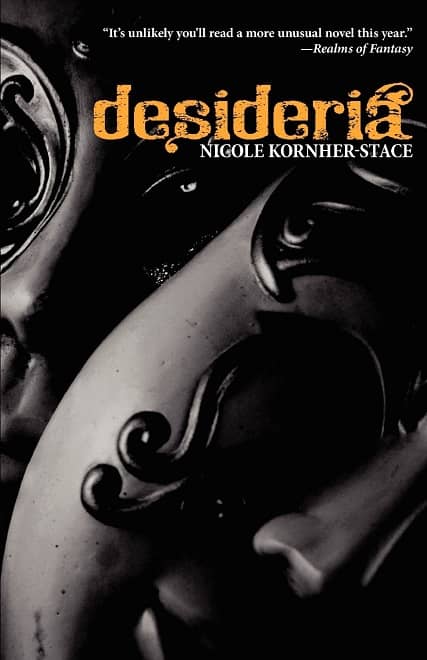 |
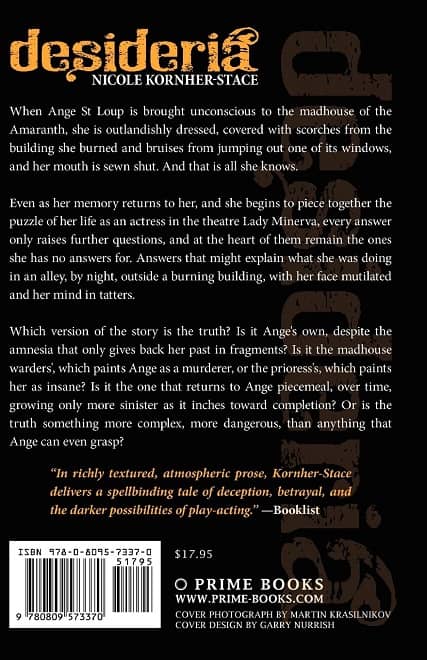 |
IV. THE EXCERPT
Latchkey
by Nicole Kornher-Stace
one
She clashed with Lissa, blade to blade, then grabbed the wrist of Lissa’s knife-hand and yanked. As Lissa’s knife slid free of Isabel’s, she stumbled forward and was promptly hauled down and in toward the elbow Isabel was firing at the hollow of her throat. Isabel pulled the strike a quarter inch shy of a crushed windpipe, paused in demonstration, then let go.
“In a real fight you’d follow through.” Isabel aimed her voice back over one shoulder, toward the twenty-odd people gathered there. Regulars of her weekly training sessions, most of them. A few new faces. Several ex-upstarts of the Catchkeep-shrine, whose stares still made her skin crawl. A duel was a duel, after all, wooden knives or no. Three years of not having to watch her back against them was, apparently, not enough to quite erase the three years when she had. “So that’s Lissa done. But maybe she brought friends.”
On cue, Bex took a swing at her. Isabel got the wooden knife in a backhand grip, dropped her weight to pivot down and under the punch, then tensed her good leg and shot upward, twisting at the hips, hissing pain through her teeth. Again she froze a split-second before she would’ve smashed the butt of the knife-handle into Bex’s temple. She could hear the gathered caught breath of the onlookers.
So easy to imagine she was right back where she’d come from. Blood on the sand, the Catchkeep-priest on his high seat, Catchkeep’s up-self twinkling overhead. The smell of the ancient dogleather Archivist-coat, in which countless girls had died. The crowd surrounding, betting on the Archivist-choosing day’s outcome. Which girl would leave the lakeshore walking on her own two feet. Which one would leave in pieces. A skull for the shrine, some blood for the fields, meat for the shrine-dogs’ dinner. Not so much as a name left behind.
They weren’t on the lakeshore now, and the stars weren’t out. It was a beautiful summer afternoon, and they were training on the reclaimed grounds of the Catchkeep-shrine after the death of the Catchkeep-priest, and the nightmare of the Archivist-choosing system — four centuries of slaughter — had died along with him.
Yet the memory remained. If anything it intensified.
She was an Archivist again and they were upstarts, they wanted her Archivist-coat and her harvesting-knife and her blood, and the Catchkeep-priest was peering down on her from his high seat, smiling pityingly, because he knew where an Archivist’s road dead-ended and he knew hers didn’t have far to go before it got there. The upstarts all smiled too, but their smile had no pity in it, only patience.
Her hands had gone sweaty. No sure grip on the wooden knife. Her mouth went dry, her throat tightening. Pure flight instinct crackled down her spine, her legs, her knife-hand. To flee this place. To fight her way out if she had to. To —
No.
She had to anchor herself. Get a deathgrip on the here and now. Quickly, calmly, she started listing towns in her head. Her own village and points south of it, places where people had managed to carve their footholds into the ashy emptiness of the Waste. Sweetwater. Sunrise. Grayfall. Refuge. Chooser’s Blindside. Last Chance. Lisbet’s Rest. Here.
Sparkles dropped slowly through her field of vision like grains of sand through water, taking the nausea and dizziness with them. Then she realized she was still holding on to Bex and let go.
Intellectually she knew better, but even now, years later, some part of her still occasionally got confused. It would hit her, maybe once or twice a month, for no particular reason she could discern. Heart slamming in her chest, hands shaking, breathing like she’d just outrun a bear. It felt like a waking nightmare, or a memory, but stronger than either. A souvenir of the ghost-place, she guessed, like a scar on her mind. Ghosts were made of memories. It made sense enough to her that she, having been part-ghost herself, could be so easily overpowered by her own.
“Plenty of ways to do damage without drawing blood,” she said firmly, wiping her palms. Clearing her throat. Drawing a steadying breath. “Next.”
This time Glory charged her. Isabel knocked Glory’s knife-hand aside, grabbed her arm, planted her good leg and tried to ignore the jolt of pain that shot up her bad one when she used it to sweep Glory’s feet out from under her. It hurt like hell, but Glory dropped hard, harder than intended. Distantly Isabel observed her own sudden petty spike of satisfaction. I could still hurt you if I want to.
“In a real fight you’d kick out her knee,” she said. “Wouldn’t be much of a fight after that. But still.” She reached to help Glory up, slower than necessary, taking advantage of that moment to quietly catch her breath. “No blood. This is important.” She raked her gaze over the ex-upstarts, their steady eyes like candle-flames, their holy scars that all matched hers. “Tell me why.”
“Ghosts,” several ex-upstarts said at once.
“I know you know.” She scanned them until she located Onya, the brew-mistress’s daughter. Ten years old, and one of the training group’s newest additions. Isabel nodded to her. “You. Tell me why.”
“Blood pulls ghosts,” Onya answered. “Salt too. But blood more.”
“And can you put a ghost down?”
“No.”
“Do you want to have to try?”
Wide-eyed, Onya shook her head. “Slag that.”
“Any of you?”
Silence.
“Neither do I.”
Even now, a couple of the youngest glanced up at this, surprised. Isabel couldn’t blame them. All they knew of Archivist-work was stories. Hunting ghosts for clues about the old dead world Before probably looked like a fun game from a distance, and in hindsight, with somebody else’s neck on the line.
“You don’t remember before the ghostgrass barricades,” she told Onya, as gently as she knew how. “When the Catchkeep-priest was alive. When I was Archivist.”
Onya eyed her skeptically. “The barricades were there when I was little,” she said. “I used to get in trouble for going up close to see.”
“You were little yesterday,” Sairy said, poking Onya in the ribs.
“Used to be,” Isabel explained, “only the Archivist got ghostgrass. Just enough to hang a bundle by the door of the Archivist-house, and burn some to draw a protective ring on the ground outside.”
Which made her remember the last ghost she’d caught, and the only one to ever have walked into that house on its own power. Hastily she shoved that thought away.
Keep moving forward, she warned herself. Like a stone skipping across water. You keep moving or you sink.
“Well, if I had ghostgrass,” Onya announced, “I’d share it.”
“And that’s what we do now,” Isabel said. “We cultivate it and make sure everyone has a share. Because now we don’t have any Catchkeep-priest making sure that you can’t protect yourselves, that you need an Archivist to do it for you.”
“Screw that,” Onya said, and a number of the others nodded agreement.
“Exactly,” Isabel said. “We’ve put this in place and now it’s our job to make sure it works. The problem is it’s been working so well that some of you are forgetting what happens when it stops. You think: I’m safe here, this is just practice, we’re in the middle of town, what will happen. But what about when you’re on perimeter? What about when the ghostgrass barricades fail? You think: they’re strong, we planted them well, they keep the ghosts out and they’ve never been breached, which stays true for exactly as long as we take steps to maintain them. We only stay safe if we stay smart. Vigilant. Lucky.”
Several of them gestured automatically to the One Who Got Away, whose plaything luck was.
Isabel nodded to Glory. It was a thank-you and a dismissal. Glory nodded back and joined the others. “I’ve seen a number of you come back from training these past few months with cuts, scrapes, bloody noses,” Isabel told them. “That’s a problem. Bruises, sprains, broken fingers, fine. Annoying, and you’ll need to call in favors on your chore rotations for a while, but you’ll survive. No blood. Whatever issues you think you have in a fight, they are going to seem very small very quickly if you bring a pissed-off hungry ghost down on you. Believe me when I say you do not want to learn that the hard way.”
A few of the ex-upstarts, Sairy and Kath and Bex, were nodding grimly. Others like Onya, who’d never had to stare down the barrel of that work, didn’t know well enough to be afraid. With luck — and a lot of effort — they never would.
“Pair up,” Isabel told them. “Practice. Blocks and counters. Get creative. You never know what’s going to happen until you’re up to the eyes in it. So what do you do?”
“Be ready for anything,” they recited.
“When?”
“At any time.”
“What else?”
“Work together,” Onya said.
“Trust each other,” Glory added. “Until the end.”
“It’s worth risking two to save one,” Bex finished.
“That’s right,” Isabel said. “Hold on to that. There’s a reason why we go over it so much. Keep it in the front of your minds when you practice. And remember: these tactics are what you use on people. Don’t try this on a ghost. You’re in a fight, you’re breaking up a fight, someone starts up with you, you’re standing perimeter and something goes bad. Okay? Now work until I say stop.”
They paired off and went to it. Isabel circulated among them for a while, making suggestions, giving advice. Here and there she reached in to fix someone’s attacking or blocking angle, or told someone to go harder or lighten up a little. Refusing to be envious of the ease and grace of their movement.
Back from the dead, she thought for the millionth time. Of course I walk like a ghost.
When her leg started complaining too loudly she sat on a rock and watched them in silence until Squirrel padded out from the back door of the Catchkeep-shine and sat at her feet. He’d been a tiny puppy when he’d lost the job he would’ve grown into, but somehow the idea of trailing her around was coded into his brain from generations of breeding toward that very purpose. Or maybe he just liked her. It was probably a good thing then that he didn’t know she’d had to kill his parents.
Sairy had named him Squirrel. She’d thought that after four hundred years of upstarts and Archivists being chased down and terrorized by the monstrous shrine-dogs that were his ancestors, it’d be funny.
“Look at them,” Isabel murmured, giving Squirrel a scratch behind the ears before setting to work massaging the knots of scar tissue in her bad leg. The ex-upstarts never ceased to amaze her. In the three years since the Catchkeep-priest’s death, they’d been like plants moved into the gardens after too long spent in too-small pots. They’d stretched and grown and thrived. It was amazing how well and how smoothly they worked together when nobody was strategically, systemically setting them at each other’s throats.
Do the work, the Catchkeep-priest used to tell her. You were entrusted with the tools to do the work, and you will do the work.
This, she thought, is what the work is now. Trading for apple-grafts and altar-candles. Chopping vegetables. Sweeping floors. Teaching people how to protect themselves. It was satisfying, honest, exhausting work, and in some ways it fulfilled a sense of purpose of which her Archivist-work had only ever skimmed the surface. The things she lived in fear of now were bad harvests, drought, running out of basic medicines, trade agreements with neighboring towns falling through. What others feared in her now was no worse than her displeasure if they shirked their chores. Nothing that would end up with somebody’s blood on the lakeshore, somebody’s skull on the shrine-wall, a dozen survivors wondering which one of them was next.
She enjoyed the work. She enjoyed the routine. She enjoyed the soreness in her muscles at the end of the day, not from dueling and murdering the living, or hunting and exploiting the dead, but from gardening, hauling water, making paper, harvesting ghostgrass, chopping firewood, drying herbs, pounding grain. Sometimes it felt like there was a hole in her and she was filling it, chore by chore, project by project, day by day. Sometimes it felt like it was working.
She sat and watched the ex-upstarts spar with townspeople and with each other, repurposing their combat skills for self-defense and the defense of their town, a small green place carved into the vast and ashen Waste under the heel of nobody. That had to count for something.
By now the sun had risen fully, the day’s heat a damp weight on her head. On the edges of the field, younger children had gathered to watch the training. Periodically they were shooed away, only to scatter and regroup like crows. More than a few of them were busily whacking each other with sticks in imitation.
Isabel took off the Archivist-coat and folded it over one arm. Ran a finger idly over the stitched holes in the dogleather of it. Even years later, no trouble at all to remember which holes she’d put there, which holes she’d scrubbed the blood from and sewn shut. But there were countless more. In some places — over the heart, between the shoulderblades — the coat was more thread than leather, more mended than whole. How many Archivists must have died in it? It was less a coat than a graveyard. Despite or because of this, she hadn’t yet been able to bring herself to throw it away.
“That’s enough,” she called, and the sparring pairs broke off, stuck their wooden knives into their belts and wiped their sweaty faces on their sleeves, awaiting further instruction. Under the awkward burden of all those expectant stares, she paused. Going from mortal enemy to mentor was a weirdness that would probably never have the edge completely ground off it. “That all looked good,” she told them. “Any questions?”
“So what happens,” Onya asked after a moment, “if we do pull ghosts?”
Isabel blinked. “You know, you’re right. We don’t really ever go over that.” We don’t really ever need to, she could have said. Because I —
“That’s my mistake,” she said instead. “We’ll go over that next week.”
“What if I see one today?”
“Grab some ghostgrass. Run like hell. Come find me and I’ll deal with it.”
“With that?” Onya pointed at the harvesting-knife in its sheath at Isabel’s hip.
“Not if I can help it,” Isabel said.
“Then how do you know if it still works?”
Isabel paused. Then, in a sudden access of honesty: “I don’t.”
“Then why do you still have — ”
“Next week, okay?” Cutting her off fast because it was either that or ignore her. Answering that question — genuinely answering it — wasn’t an option. Isabel struggled to soften her tone. “I promise.”
“Here,” Sairy said. “I got this.” She reached in and tied a long braid of ghostgrass blades around Onya’s ponytail. “See? Nothing touching you like that. I could throw a ghost at you right now and it’d bounce off.”
Onya lit up like a warn-fire. “Can you?”
Sairy swatted her. “No.”
“Can I see the knife then?”
“Fine,” Isabel said, relenting. “Stand back.” The harvesting-knife had a blade the length of Isabel’s forearm, more of a hilt than a handle, and a guard like a sword. Because it used to be a sword, she knew now, and long ago it had been broken, tapering the remaining blade unevenly.
“What’s this?” Onya asked, poking at the shiny blue-black synthetic wrapping of the grip.
“Before-stuff,” Sairy said.
“It’s so smooth.” She ran her finger back and forth, then withdrew.
Isabel glanced over the others. “Nothing else? Okay. Dismissed.”
They broke and wandered off in ones and twos, and when they all were gone Isabel stood and made her way across the grounds toward the shrine, Squirrel padding along beside her.
Halfway there, she slung the Archivist-coat down on the sunbleached grass and stopped to tie up her hair. She hadn’t cut it in a while and it was just long enough to be gathered in a string and kept off her neck. There’d been a few years when she’d almost forgotten what color her own hair was, it was so interbraided with the shorn-off hair of every upstart she’d killed, and the Archivist she’d defeated even before that — and besides, it wasn’t like she’d had a mirror on her wall to see herself in. She’d cut off her braids down in the ghost-place and never missed them once. Her own hair had come in thick and brown. It could’ve been piss-yellow and glowing for all she cared. She hadn’t seen her reflection in ages.
She picked the coat back up and kicked her way through a late patch of suns-and-moons overgrowing the path. Too close to autumn for suns, but the moons went up in an explosion of silver-white fluff, almost the exact color of a weakened ghost. Ignoring the spike of pain in her leg, she kicked them toward the grassy side of the path. More fluff meant more seeds, more seeds landing on viable ground meant more edible leaves next spring. They say people used to wish on these things, she thought, and kicked harder, sudden anger driving off the pain. They should’ve known better.
